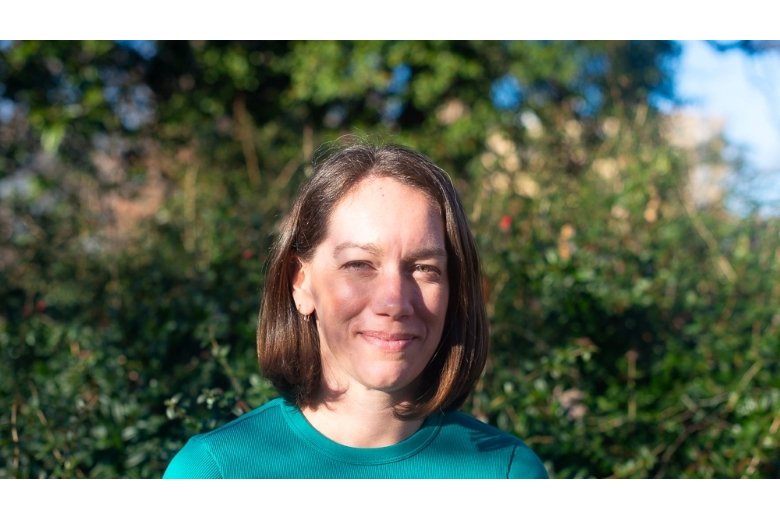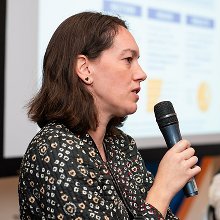The new executive director of Accountability Counsel reflects on what accountability mechanisms and civil society organizations must do to serve communities.
"We are seeking community-led accountability."

Margaux Day, Accountability Counsel Executive Director. Photo courtesy of Margaux Day.
By Jennine Meyer
A lawyer and a well-known figure in the field of accountability, Margaux Day became Accountability Counsel’s Executive Director in February 2024. Having served as the organization’s policy director for four years, she is now charting an ambitious course to fulfill Accountability Counsel’s aim to advocate for people harmed by internationally financed projects as they seek justice. She recently talked with Accountability Matters about her vision and the challenges ahead for accountability mechanisms. It is clear that communities impacted by investments remain central to achieving this vision. “The question of what accountability means has a multi-faceted answer, and it must be answered by those who are most impacted,” she explained. This interview was edited for brevity and clarity.
Tell us about the professional journey that led you to this point. How did you decide to focus your career on accountability?
Perhaps the one thing that was clear to me from the start was that I did not like traditional lawyering and instead saw the power in being an advocate who supports clients to lead their own initiatives. The truth is that the rest took some trial and error. I am the first lawyer in my family, so I needed to explore multiple legal positions to learn what I wanted to do and what this profession means to me.
But the nice thing is, with the benefit of hindsight, I think I can draw a through line and see that an interest in accountability began early on. For instance, my college thesis asked the question, “How do we know whether international aid actually helps the people it intends to?”
What are your plans for Accountability Counsel? What do you hope to achieve?
Big picture: we are seeking a world where all financial institutions are accountable to the people that they impact. We have ambitious plans to make that happen, particularly looking into the next two years.
First, we are going to advise communities seeking justice as they file new cases.
Second, we are also really excited about two key research initiatives. The first one is called The Accountability Resource Guide. This will be a website that explains the accountability process of each mechanism, designed for communities who are thinking about filing complaints. We are trying to create a community-friendly resource that assists communities in making their own decisions on whether to file complaints and how to navigate the complaints process.
This year, we are also asking a fundamental question about our field, namely, “What outcomes do communities actually achieve through these processes?” By looking at every single complaint that has either had a finding of non-compliance or a dispute resolution agreement, we seek to answer: “What has been the impact on local communities and their environment? What does that say for our field going forward?”
Finally, we are going to seek reforms through official accountability mechanism reviews over the next few years. The Asian Development Bank, Asian Infrastructure Investment Bank, European Bank for Reconstruction and Development, European Investment Bank, and the World Bank are already—or will all be engaged—in reviews in the next two years and Accountability Counsel needs to make sure that the reviews result in more effective mechanisms for communities.
Lastly, mark my words: we are finally going to convince the United States Development Finance Corporation and the U.S. Agency for International Development to fully implement their accountability mechanisms.
We’re promising ambitious impacts because our mission feels as urgent as ever. We see financial institutions lending more money more quickly, some under the dubious label of climate finance, and accountability is not keeping apace.
What is the role of Accountability Counsel vis-à-vis smaller civil society organizations?
We work in partnership with civil society organizations globally as part of this broader movement for community-led development, and we see in our case work, in our research, and in our policy advocacy that we are more effective when we’re partnering and doing this work together. So again, there is an ethical and a moral reason to not do this alone. But there is also the question of effectiveness: we are stronger together.
Our global community of advocates have an outsized impact, and we should be proud of that. We are going against established practice and entrenched systems, so it means that every win is hard-earned.
Independent Accountability Mechanisms (IAMs) often struggle to make communities aware of the options they have to lodge complaints with them. What is the role of civil society in bridging the outreach gap and in supporting communities, and what challenges do they face? What more can IAMs do to raise their profiles among communities?
Communities who need to access accountability mechanisms have families, jobs, and hobbies. In other words, they have lives, and when they are harmed by international finance, they are put in a position that they didn’t choose. The communities we work with are inspiring, exceptional advocates but often they didn’t want to be advocates in the first place.
This is where civil society organizations come in. We are privileged to do this work as our job. We can take some of the burden from communities who shouldn’t have to bear it in the first place. Civil society also advocates for better systems so that communities either aren’t harmed in the first place or have more effective channels for redress when they are.
What can IAMs do to raise their profiles? Good cases speak for themselves. The most frequent question that people ask us when they are thinking of approaching an accountability mechanism is what happened in prior cases. “What can I expect?” Successful or effective cases—or however you want to define it—with outcomes where communities receive some of the remedies that they deserve, where they feel that there has been accountability, and where they feel there is justice—those will speak for themselves and be shared. And when there are cases that don’t have those types of outcomes, that is also going to be shared and that is going to be one of the barriers—and reasonably so—to people coming to the accountability mechanisms in the first place.
You have traveled extensively throughout your career. What are the most innovative outreach ideas you have seen?
The number one barrier to accessing accountability mechanisms is that people don’t know about them. And then layer on the thousand other barriers after that point. But awareness of the channel is the first step, which is why I have such esteem for the accountability mechanisms that take that outreach seriously. It is so critical.
Of course, it shouldn’t be fully the work of the accountability mechanisms or civil society to raise awareness about IAMs. While I am incredibly appreciative of the IAMs that are doing that outreach, we almost shouldn’t be in this situation in the first place. Banks and clients should be heralding accountability mechanisms as critical good governance tools, but we rarely see that.
For outreach, I don’t see one innovative, fun, or interesting anecdote as the solution. That said, we have seen outreach involving local civil society organizations who have experience with the mechanism as being more effective because it gives communities a more predictable understanding of what will happen. The accountability mechanisms can explain the process—they can explain it honestly and talk about the challenges and limitations and manage expectations. But it is then important for civil society organizations or community advocates, following that, to have the space to say, “This is how it felt to do this” and “Something wasn’t successful last time, but here is what we learned around that. Here are some ways that we managed our expectations and know how to do it better going forward.” When Accountability Counsel and other organizations have been able to participate in IAM outreach events, we’ve seen a more realistic, fair assessment—one that is more successful in showing communities what they can expect from the process.
It seems that there isn’t a single definition of accountability—it means different things to different people. How do you define it?
There shouldn’t be a single definition, because what accountability means is defined by each impacted community member, and we are seeking community-led accountability. This means that impacted communities should be co-designing remedy or accountability with the financiers. In practice, we know that this can look like a whole host of things. It can be redesigning a project to prevent harm in the first place. It can be an apology and an acknowledgement of mistakes. It can be land, livelihoods trainings, jobs, cleaning up polluted water, and compensation. It can also be about the institutions learning from mistakes and changing their practices going forward.
The reason we are all asking the question of what accountability means is that it must have a multi-faceted answer, and it must be answered by those who are most impacted. That is really the power of an effective accountability mechanism. An accountability mechanism is a tool to speak truth to power. An accountability mechanism creates a channel where the very people who are impacted can say, “This is what happened to us, and this is what we need.”

